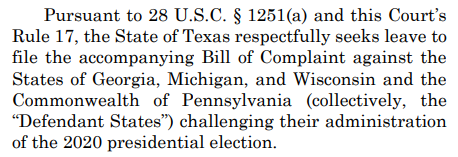
For those curious about this doctrine. The “Colorado River doctrine” is named for Colorado River Water Conservation District v. United States, 424 U.S. 800 (1976).
1/
1/
https://twitter.com/questauthority/status/1335945486990184448
The actual background is kind of fascinating, and if anyone (particularly east of the Mississippi where you don’t deal with prior appropriation) wants an explanation of “what the hell does ‘owning’ water even mean” I can explain.
2/
2/
But the upshot is this:
Following changes to Colorado water law administration there were a whole lot of lawsuits in Colorado courts about water rights, including the water rights of tribal land (administered by the US itself).
3/
Following changes to Colorado water law administration there were a whole lot of lawsuits in Colorado courts about water rights, including the water rights of tribal land (administered by the US itself).
3/
Congress also passed a law allowing the US government to be joined as a defendant in water rights cases in state court over the adjudication and enforcement of water rights, particularly where the US government owned or controlled the water.
4/
4/
So, when the US sued the Colorado River Conservation District, it was also being joined as a defendant in the state court cases. And now the federal court has a conundrum:
“I’m being asked to adjudicate the same issue as raised in state court”.
5/
“I’m being asked to adjudicate the same issue as raised in state court”.
5/
Abstention had existed before, but all dealt with issues of “guys, this is really about state law first and foremost” (Pullman, Burford), or just order of operations (Younger, can’t sue for civil rights violations related to a prosecution until the prosecution is over).
6/
6/
The court in Colorado River looked at the cases and said “won’t this just be a massive waste of time? The state court claims came first, resolving all the same issues, and nobody wants a bunch of piecemeal cases decided by different courts with inconsistent decisions”
7/
7/
And when that view was endorsed by the Supreme Court, a doctrine was born. It’s basically the doctrine of “don’t waste everybody’s time with duplicative claims you bring in multiple courts over the same underlying issue”
8/
8/
Note: this is different from the Rooker-Feldman doctrine some followers may have seen me and @AkivaMCohen laughing about. That has to do with a lack of jurisdiction because the state court already rendered a decision. Abstention is about concurrent cases.
9/9
9/9
• • •
Missing some Tweet in this thread? You can try to
force a refresh










